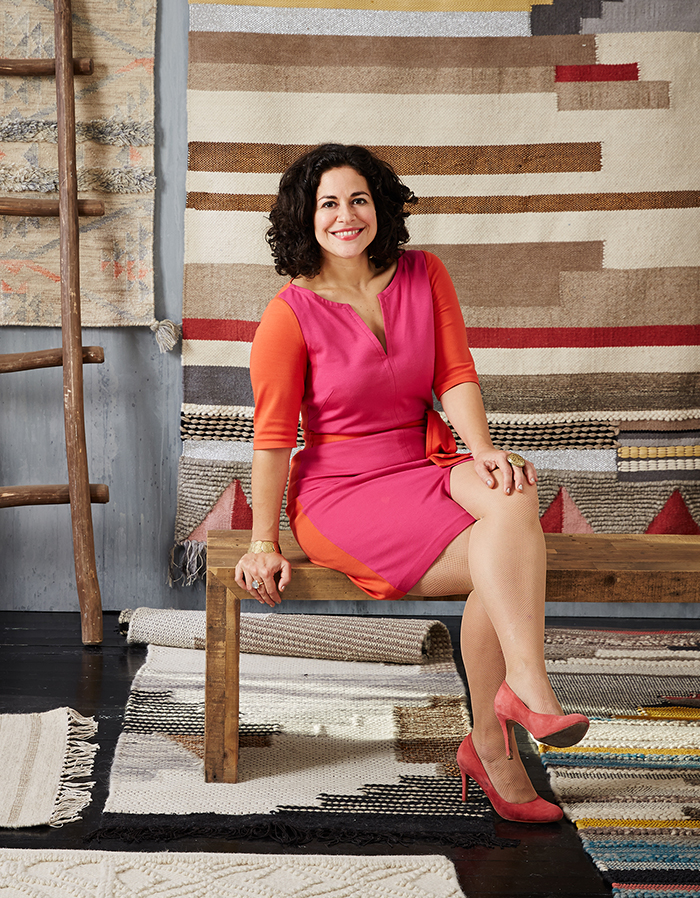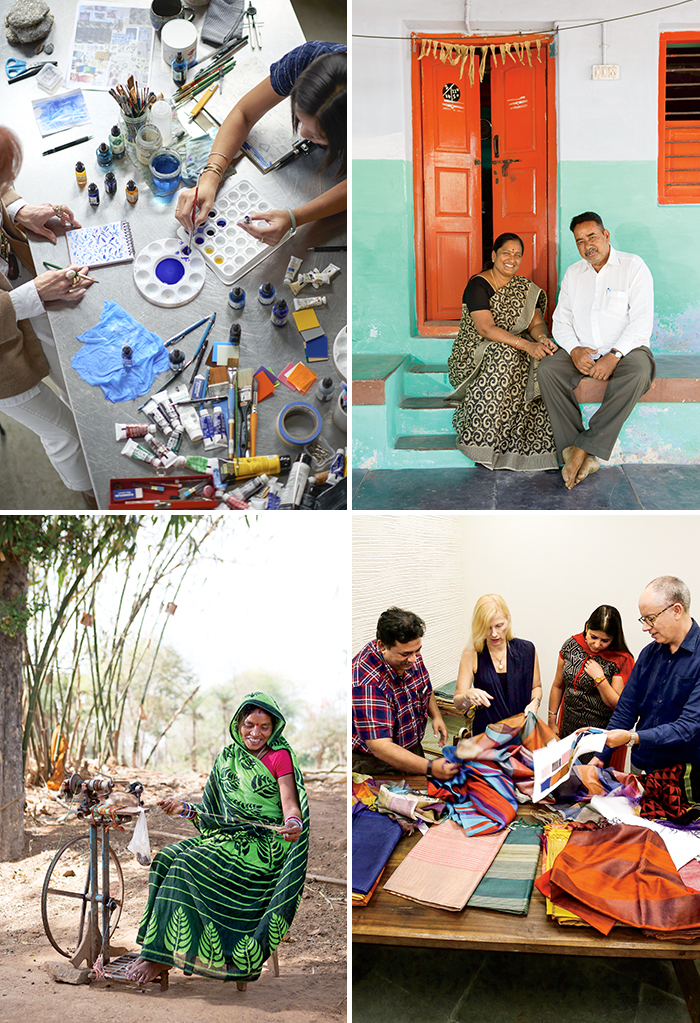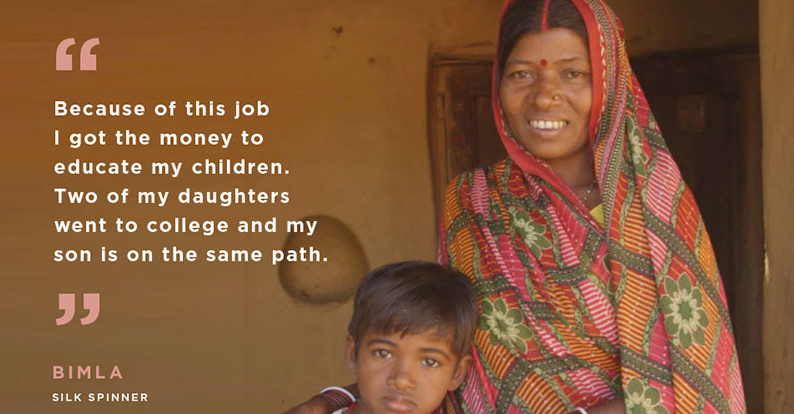As Vice President of Social Consciousness & Innovation at west elm, NYC based Jennifer Gootman is a woman leading change. Jennifer heads west elm’s commitment to increased sourcing from artisans, supply chain transparency, and sustainability. So committed is she to implementing best practices around these goals that she created and pitched her job role to west elm.
Jennifer says “I see my work as implementing the best practices of the non-profit and social sector within a company’s supply chain. What we call west elm’s “consciousness programming” is really about looking inward to see how we can use the way that we do business to create a positive impact”.
I’d been reading about west elm’s long term commitments to handmade products and to working with artisans from around the world. That’s when I found out about Jennifer Gootman, and I became fascinated by her journey, and her vision and passion for change – both on a practical day to day level and in an overarching sense.
“We’re trying to set the industry standard for how a retailer can use purchasing power to create economic access and social change, all while continuing to bring our customers beautifully designed, unique, contemporary products”, explained Jennifer.
I’m very excited to share my interview with Jennifer Gootman because I think she’s remarkable. You can see that from just looking at her don’t you think? This isn’t a quick read so grab a cuppa and settle in. I promise it will be worth it.

How did your role at west elm come about?
West Elm has always followed the mantra “a little greener every day”, but our “design to impact” work really amplified since Jim Brett joined as president in 2010. He encouraged the design team to collaborate with artisan groups to create unique, modern designs using traditional techniques and, in the process, generate employment for under-served artisan communities.
I met Jim when I was running a non-profit organisation that provided market access to artisan groups. I pitched the idea of working together and eventually joined west elm in 2013 when it made its public commitment to invest US$35 million in handcrafted goods and grow the artisan sector. My job was to make sure we provided support to artisan businesses as our orders grew, and to launch our education programs with artisan communities globally. As the handcrafted program took off, I also had the opportunity to launch the Fair Trade program. More recently, west elm has started working on some ambitious goals around sustainability and my job has expanded.
Tell us about your career path and background prior to joining west elm.
I’ve always pursued work that I’ve been passionate about. Before west elm, I spent most of my career working in the non-profit sector, first as the communications director for a non-profit art gallery in New York and then as deputy director of a non-profit magazine and think tank that focused on social services, workforce development and economic development. I decided to go back to school and get my MBA. I spent my summer then working for a non-profit in Nicaragua, where I planned and implemented a distribution and scaling strategy for a jewellery business that trained and employed disadvantaged youth. After my MBA, I became the executive director of a non-profit that provided market access to more than 40 organised groups of women artisans around the globe. I managed everything from design and development to shipping to warehouse, e-commerce and marketing.
After several years there, I began thinking about how even small changes in a large corporation could make big change. I wanted to be somewhere that really shared my vision and passion and was open to new ideas and innovations. I could tell west elm was deeply committed to the same values. Thankfully, west elm also recognised the potential of bringing on someone like me to lead this work.
What do you and your team aim to achieve, and how does that happen on a practical day to day level?
We have very clear goals: maintain handcrafted as 20% of our assortment through 2020; certify 20% as Fair Trade by the end of this year; reach 100% responsibly sourced cotton and over 50% responsibly sourced wood by 2020 – and that’s just to name a few!
On any given day, that could mean working with west elm designers to discuss potential new products to develop with one of our artisan groups, meeting with our sourcing team to look at our progress in transitioning to organic cotton, meeting with a vendor to hear about their challenges in becoming Fair Trade Certified, or working with our marketing teams to share stories from our supply chain and pitch ideas of how to communicate our work to our customers.
Many of west elm’s products are handmade and Fair Trade Certified. What does this mean for the artisans, for west elm and for the west elm customer?
While we want our customers to buy a product because they love the design, it’s also our responsibility to ensure that we are adding value for the makers and the communities where our products are made. For example, west elm pays a premium on every product purchased from a Fair Trade factory, which goes directly into a fund managed by a committee of elected workers. Workers then decide themselves how they would most benefit from the funds. One factory in India used the premiums to purchase bicycles to get to and from work more easily, food vouchers for major holidays, and rice cookers. It’s amazing to see how engaged and empowered the workers in a Fair Trade factory are, knowing that they are directly connected to and appreciated by the people buying their products.


Could you give us an example of a Fair Trade and sustainably sourced west elm product and a brief outline of the process from concept to store.
The Geometric Ceramic Tile Vase is made in the Philippines by a family-run artisan business in Santo Tomas, a region known for its ceramics. Our design team collaborated with the makers to create a collection based on the artisans’ traditional materials and techniques but with a fresh, design-forward look. The raw red clay is mined from around the island. After the clay has been processed, artisans hand-throw each piece, forming it on a traditional potter’s wheel. Once the shape is right, artists develop patterns by embossing, cutting or carving the surface. Pieces then dry for several days before they’re fired, glazed and finished by hand. These artisans now have a savings and investment fund at the factory that was started as the result of a financial literacy program that we funded there in 2015. And that’s just one collection!
Today our handcrafted program works with more than 20 groups in 15 countries, reaching over 5,000 artisans. Craft is the second-largest employer in the developing world after agriculture. In many rural communities, craft production is one of the only ways to earn money to feed and educate children.
The ground roots movement towards caring for one another on a global level is very much the zeitgeist of recent times – especially given the current, often divisive, political environment. The things you’re implementing at west elm speak to that, but do you see much change happening elsewhere in global supply chains?
I am certain that we are in the midst of a major change in global supply chains. I have so many colleagues at other brands who are passionate and committed to the same causes that I am, we share ideas and use each other as a resource. There are industry associations, such as the Sustainable Apparel Coalition, that are bringing together competitor companies to work collaboratively on solving some of these massive challenges. There is a host of new companies that are creating innovative models for a new age, like Evrnu, which is developing technology to turn post-consumer textiles back into new fibre, and non-profits like Nest, which is working with us on the Artisan Advancement Project. But the biggest change will come when consumers demand it and act accordingly, so it’s really on all of us.


Your career path is inspirational. What advice you would offer our readers about forging a fulfilling career?
1. Take risks! Some of the best opportunities come about when you go out on a limb. Mistakes are inevitable and make great moments for learning.
2. Be generous. Sharing your time and ideas comes back in spades.
3. Respect everyone. Approach all as if they have something to contribute.
4. Listen and learn. Authority doesn’t come from having all the answers, it’s more important to ask the right questions and really hear what people say.
5. Make it personal. The best careers are when you can bring your full self to your work.
6. Be a problem-solver. Lots of people can point out the problem, but it’s much harder and much more useful to bring solutions that are impactful and influential.
… and what’s the most important takeaway about socially conscious consumerism?
Big changes start small. Find something that you can do to make a difference in the way you purchase or use products. I firmly believe that progress can come from many small steps rather than giant leaps. If everyone tried to be a little more conscious of the implications of their actions, the cumulative impact would be huge. After all, on both sides of the supply chain, we’re just human.
All images courtesy of west elm.
Read more about west elm’s commitments to ambitious ‘Design to Impact’ goals in five key areas: handcrafted, Fair Trade Certified™, organic, sustainably sourced and local.